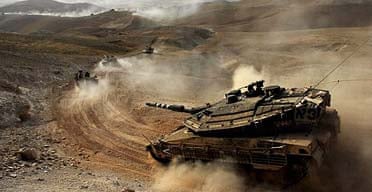In temperatures of more than 40 degrees, Israeli soldiers are moving in formation up the slopes of Mount Hermon in full battle dress, a few miles from the Syrian border.
Down on the main plateau of the Golan Heights, new army camps are being set up and there are more military than civilian vehicles on the roads that link old battlefields and new vineyards.
Despite talk of peace, both Syria and Israel are preparing for war amid mutual distrust and confusion. "There has never been such a state of readiness since the 1980s and there is a great danger of a chain reaction if one sides makes a mistake in reading the other's intention," said Eyal Zisser, a strategic analyst at Tel Aviv University.
Both Israel and Syria are issuing contradictory signals. In August last year, President Bashar Assad of Syria said he was interested in peace with Israel but would consider war to regain the Golan Heights, lost by Syria 40 years ago.
Last week, Ehud Olmert, the Israeli prime minister, sent messages to Mr Assad that Israel was willing to give up the Golan in return for a peace deal. The messages were conveyed at the same time as the Israeli army carried out a training attack on a mock Syrian village in the south of Israel.
According to Mr Zisser, the confusion is caused by Israel's uncertainty over its own desires and the intentions of President Assad.
"We don't know how serious Assad is regarding war or peace. There is also confusion on the domestic implications for the government. Then there is also the question of the attitude of the United States, which is currently against negotiations with Syria," he said.
In the meantime the armies are training and maintaining a high state of readiness. "What you can see is military preparations on both sides. Armies have their own logic. If there is a possibility of war then they prepare for it," said Mr Zisser.
The 40,000 residents of the Golan continue with their work in farming and tourism, accustomed to living in a frontier province which is as marked by war as the fields of Flanders.
The Golan begins at 200 metres below sea level at the Sea of the Gallilee and rises to 2,800 metres at the top of Mount Hermon. Most of the land is a gently sloping plateau guarded by eight volcanic plugs that overlook Syria. Some of the plugs are fortified and others are crowded with antennae, radar and observation equipment to monitor Syrian activity.
Much of the west of the plateau is covered by Syrian minefields and every few miles there is a war memorial, old tank or derelict barracks. Half of the residents of the Golan are Druze; they retain their Syrian nationality and reject Israel's rule over them in theory, but cooperate with it in practice. Around 100,000 residents of the Golan left their homes during the 1967 war and were not allowed to return by Israel. The other half are Israeli settlers who continue to move to the Golan despite the common understanding that Israel will return it all to Syria in return for a peace deal.
Albert Hecht, a Golan resident originally from Glasgow, said that there was an obvious increase in Israeli military activity.
"You do sense there is a military build up going on. For years there was very little training here and now they are reopening camps that have been empty for years.
"We are in a constant state of readiness. We were hit by a few missiles last year from Lebanon and we all have bomb shelters. We are pretty sure that if things take a turn for the worse the army will be able to evacuate us very quickly," he said.
The residents of the Golan say that they live as if they will live here forever. "We have built home, businesses and vineyards here. No one told us to stop growing," said Mr Hecht.
The local council says that 1,500 families have moved to the region in the last five years and there is strong investment. The main town of Qatzrin has a newly built mall, featuring a micro-brewery, a winery and multimedia shows that offer a very partisan history of the Golan to tourists.
Moti Bar, the manager of the micro-brewery and restaurant, said that he did not expect the talk of war to deter tourists who make a major contribution to the local economy. "Israelis are used to this kind of atmosphere, they do not plan their holidays according to the news. They understand politics and that the things that appear in the news are not always as they seem. If we did not then we would have no life at all," he said.
Golan settlers, unlike their counterparts in the West Bank and Gaza, are not driven by religious conviction and admit that Israeli sovereignty over the Golan could be traded for peace. Both Mr Hecht and Mr Bar said they hoped that any peace deal would involve Israel leasing back the Golan from Syria for a period of 20 to 100 years.
However, the Druze residents who are clustered on the slopes of Mount Hermon in the north-east of the Golan, see the settlers' work in a different light. Ayman Abu Jabel, who served 12 years in an Israeli jail for throwing a grenade at an army base, had little sympathy for the settlers.
"The settlements must be destroyed and the settlers must leave. It is not their land. Everything they have is stolen," he said.
Mr Abu Jabel said there were economic advantages to living under Israeli occupation but added: "I would be happier to have the bad things of my own country rather than the good things of Israel."
